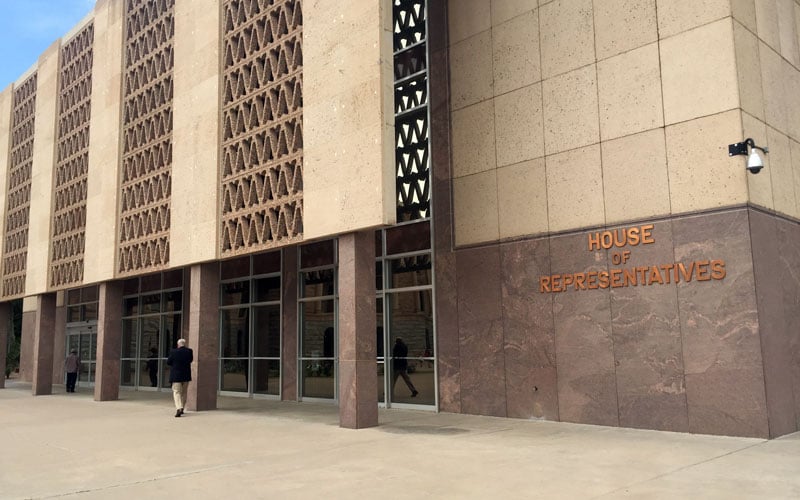
Press advocates called the new policy that pushed reporters off the House floor this week “very troubling,” but lawmakers insist the proposal is merely an additional safety measure. (Photo by Miguel Otárola/Cronkite News)
WASHINGTON – As state and national press advocates reacted Friday to what they called “invasive” background checks for media at the Arizona Legislature, House Republicans were refusing to back down on an issue they insist is being blown out of proportion.
“It’s not about banning media from the floor,” but about the need for increased security in the Capitol, said Stephanie Grisham, a spokeswoman for the Republican Majority Caucus. She said recent news reports that charged reporters had been barred were “completely inaccurate.”
The dispute began Monday when House administrators asked nonstaff to submit to a lengthy background form that included Social Security numbers and other personal information, information that was taken off the form later in the week.
But Capitol press refused to comply with the revised form, which House officials are requiring for anyone with access to a nonpublic part of the Capitol. As a result, more than a dozen photographers and reporters were turned away from the House floor Thursday and forced to cover that day’s session from the gallery.
National free-speech organizations said Friday they were concerned about the background check, some more than others.
“It’s certainly very troubling to hear that reporters would lose that kind of access to lawmakers,” said Melissa Yeager, senior staff writer at the Sunlight Foundation in Washington.
Yeager said there have been similar conflicts in the legislatures of Missouri, Kansas and Maine when lawmakers in those states limited the access of reporters.
Editor’s note:
An earlier version of this story misstated the background of a reporter involved. Arizona Capitol Times reporter Hank Stephenson has a 2014 misdemeanor conviction, according to his paper. The story here has been corrected, but clients who used earlier versions of this story are asked to run the correction that can be found here.
“There are a lot of relationships that are built by having access to the floor, to be able to talk to lawmakers and see who they’re interacting with,” Yeager said. “It creates better reporting when people can have a conversation and ask questions. Putting someone up in the balcony, where they don’t have that sort of access, will definitely hinder reporting.”
Newseum CEO Jeff Herbst agreed that it’s in the best interest of the public to have reporters as close to local officials as possible.
“People are hungry to understand what elected representatives are doing and how they’re best representing them,” Herbst said.
He downplayed the suggestion that there is an increased security risk, noting that the dangers of sitting in a legislature are minimal compared to other occupational hazards.
“It’s far more dangerous driving on the road each day, but no one says to ban all drivers,” Herbst said.
But Grisham said the security concerns are very real, citing recent protests and activity at the Capitol, including a March 28 incident that led to the arrest of one man.
“These are new times and this is a really heightened political climate,” Grisham said.
She emphasized that all non-staff must comply with the new rules, including vendors, interns – even the house chaplain and the doctor of the day. And she said the new rules should not have come as a surprise to anyone.
“This security plan, and the protocols within, have been in the works for a year,” Grisham said. “Nothing happened yesterday.”
Morgan Loew, president of the Arizona First Amendment Coalition, was taken aback by the requirements, which were put forward by House Speaker David Gowan.
“This does have a chilling effect on the watchdogs of our lawmakers,” Loew said. “We certainly, vehemently, disagree with this decision.”
Loew said members of his coalition are reviewing the policy and considering next steps, including possible legal action.
“When we are singled out for something that impedes our ability to carry out our rights under the First Amendment, which is freedom of expression, freedom of press, there is a problem,” Loew said.
But Ken Paulson, president of the First Amendment Center and former editor of USA Today, said that what happened at the Capitol does not necessarily violate the First Amendment.
“Given that reporters are still able to see and hear the proceedings, this isn’t a First Amendment issue,” Paulson said in an email Friday. “It does make reporters’ jobs harder and makes legislators less accessible and accountable to the public and press – which may be what the legislature intended.”
Grisham said that there are currently no plans to change this new requirement.
She adamantly denied published reports that Gowan was targeting Arizona Capitol Times reporter Hank Stephenson with the new rule. Those same reports said Stephenson has a misdemeanor conviction that could fall under the new rules.
Stephenson wrote a story in January criticizing the speaker’s use of state vehicles, leading Gowan to reimburse the state with $12,000 of his own money.
Grisham said House staff had no knowledge Stephenson had a conviction on his record, and said she is on good terms with him.
“He and I get along very, very well,” Grisham said.